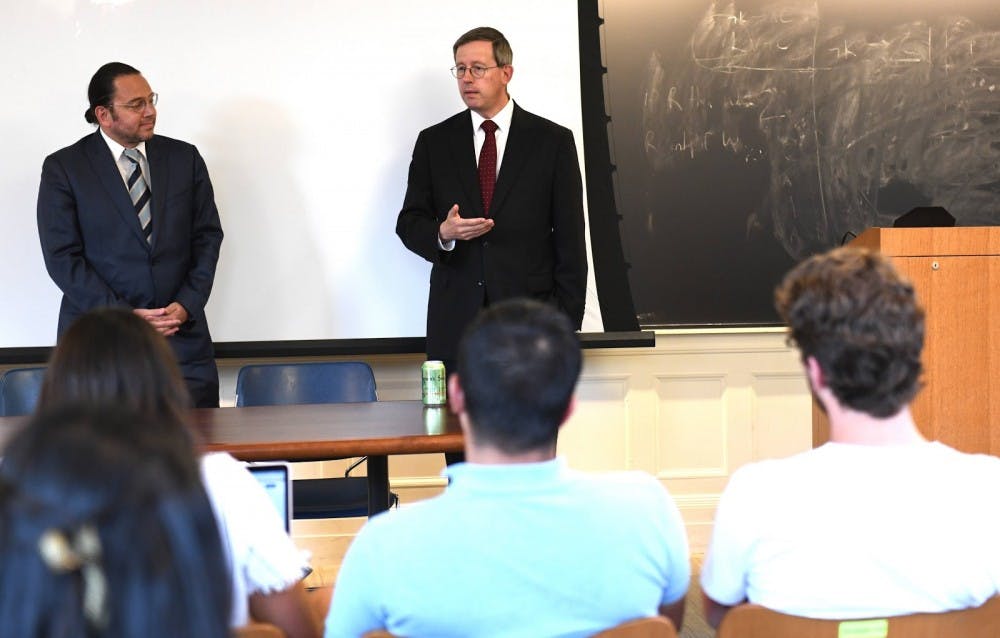Francisco González and Christopher Sands gave a lecture on the Homewood Campus focused on the history and present state of the trade agreement between the United States, Mexico and Canada. González is an associate professor of International Political Economy and Latin American Politics, and Sands is a senior research professor and director of the Center for Canadian Studies, both at the School of Advanced International Studies (SAIS). The event was sponsored by the University’s International Studies Program.
The speakers explained the North American Free Trade Agreement (NAFTA) and its proposed replacement, the United States-Mexico-Canada Agreement (USMCA). They stressed the perceptions the countries had of each other, especially regarding cultural differences, and the influence these perceptions had on the way they treated each other.
The speakers emphasized the perspectives of their primary countries of study. Sands highlighted the Canadian view of the trade agreements, and noted that NAFTA’s history could be read as the history of the U.S.’s individual relationships with Mexico and China, respectively.
“Canadians don’t know much about Mexico,” Sands said. “The history of NAFTA in practice was often a history of two bilateral relationships side by side, and not a triangle.”
González emphasized the historical mistrust that the Mexican government felt towards the United States, while highlighting the fact that Mexico has thus far been the only country to ratify USMCA.
“Mexicans wanted to do as little as possible with the U.S.,” González said. “We never felt as if we were equals with the U.S., we always felt distrustful of American intentions.”
González explained the perceived cultural disconnect that exists between Canada and Mexico.
“Canada for Mexico was, first and foremost, a colder place than the U.S., not just in climate. It’s the spirit of the people,” González said. “If the U.S. was formal and serious for Mexicans, Canada was even more so.”
President of the International Studies Leadership Council (ISLC), which helped put on the event, Franz Osilia Rincones, explained his understanding of the mistrust between Canada and the United States.
“[The] United States is the most powerful nation on the earth. To Mexicans, it was a nation that needed to be treated with respect. But as Dr. González said, also a nation that could not be trusted,” Rincones said.
Rincones stated that this mistrust began in the 1840’s, when the United States seized about half of Mexico’s territory during the Mexican-American war.
“Since then, even though Mexican administrations have been relatively business friendly towards the United States, there’s always that remaining mistrust,” Rincones said.
Junior Carmela Irato, vice president of the ISLC, which helped to put on the event, explained that it was interesting to learn about NAFTA and North American trade from perspectives outside of the United States. She stated that it broadened the scope of her curriculum to see the trade agreements from these viewpoints.
“Usually when you read about USMCA [and] NAFTA, we have a very American perspective. But these professors perfectly complemented the different perspectives that we are missing from our curriculum. Like we never know about the importance of Canada and Mexico,” said Irato. “It would be the United States in the center and how its relationship works with Mexico and Canada. What is lacking is the Canadian-Mexico relationship.”
The event was part of the ISLC-organized Aronson Center Speaker Series, which hosts University-affiliated speakers that lecture on international affairs.
Rincones said that these events are meant to involve students more deeply in their studies outside of the classroom.
“The Aronson Speaker Series, at the end of the day, is about being able to learn outside of the classroom. It’s about being able to bring speakers that we usually are not able to find here on campus, like SAIS professors,” Rincones said.
Irato agreed with Rincones regarding the importance of the ISLC events.
“These kinds of events not only brought together our students from different points of view about one single topic, but also allow us to connect with our professors. Professors come to these events,” Irato said. “It’s a way of getting more integrated with the curriculum.”





